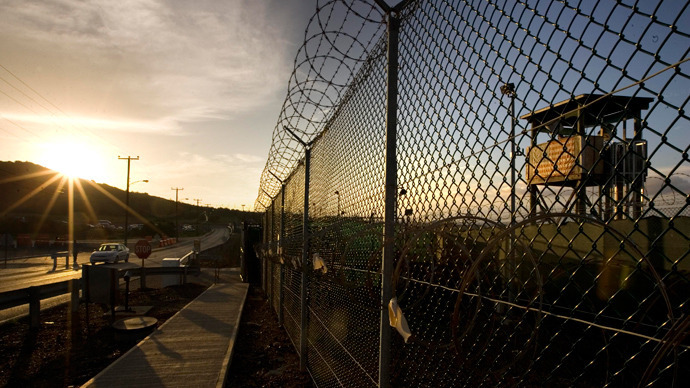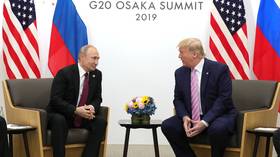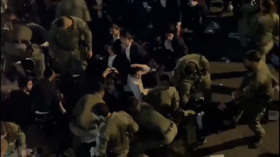‘Still no proof that Gitmo prisoners really committed a suicide in 2006’

An NCIS report shows only the US government’s official story while no careful investigation has ever been conducted to determine what actually happened with the Guantanamo prisoners, law professor Mark P. Denbeaux of Seton Hall University told RT.
In June 2006 three Guantanamo detainees were found hanged in their cells. US officials said two of the men were from Saudi Arabia and the third was from Yemen. The Naval Criminal Investigative Service opened an investigation into the deaths and concluded that it was suicide. Nevertheless, this incident has caused debates and criticism, with a number of lawyers and experts claiming that it wasn’t a suicide.
RT:What facts exist to refute that these three deaths were suicides?
Mark Denbeaux: It’s probably overstating what the findings are. We are academics. What we have found is a compelling evidence that however the men died they didn’t appear to have died in the manner that the government claims they did. The government claims they hung themselves in their cells by committing suicide, and the problem with that is that there were five guards watching 24 cells, not all of which were occupied. And there are five guards in all times, including several walking in the short little corridor and videos. If you read through the NCIS (Naval Criminal Investigation Service) investigators form, you’ll read that the men had been dead for more than two hours when they were brought to the clinic. My students, many of whom have been soldiers, say that if you have five guards guarding 18-20 people and three of them die and are left hanging in their cells for several hours, people should go to jail because the military failed to comply with their obligations. So the conclusion was that if the guards were not punished it was not plausible to believe that they died hanging in their cells for two hours. How they actually died is not something we saw. We read and evaluate government documents; we are not investigators in our own right. So all we do is read what our government documents show and report what they show. I think most people found our conclusions that we found from the facts they cited, show that the government’s official story cannot be right. The truth is not something that we can ascertain here because we are not investigators.
RT:What is more probable, that the Naval Criminal Investigation Service was incompetent or that it tried to hide evidence intentionally?
MD: The problem is that you have many people playing in the way of the investigation. The naval criminal investigation took place in the first two or three weeks of June 2006. The final report was published in August of 2008, 26 months later. So there were certainly serious problems with a published report as we discovered when we looked at it in 2008 and 2009. Whether the investigators themselves were the problem, whether the people removed the documents from the file, we can’t tell, but we have found now other documents that were in other files, that are part of the NCIS official file but which contained records from the NCIS file that was inconsistent with the NCIS conclusions.

RT:If the US government admits that these deaths were the result of torture, do you think it will help the movement to close Guantanamo?
MD: I think the movement to close Guantanamo is very robust. I don’t think that the government would admit it was torture and I have no evidence that they died as result of torture. All I know is that the three men died inexplicably in circumstances that cannot be as officially reported. But if you want to go to the movement to close Guantanamo, it is being closed. I’ve been representing people there for 9 years, and most of the people who have already been released and about a hundred are looking for places to take them in. I think Guantanamo is being closed but that’s a separate question from what happened to those men that died. Something terrible happened to those men that night, it may have been torture, may have been suicide, it may have been an accident, but the one thing we know is no careful investigation has ever been conducted to determine how this could have happened and what actually happened.
RT:The commander at Guantanamo, Rear Admiral Harry Harris, described these deaths as "an act of asymmetrical warfare wage against us". What did he mean by this?
MD: That is a seemingly heartless statement and probably is a cause of this internal investigation of ours. That’s not how people talk about people who have died, as if they did it on purpose to hurt America. They died and we should care about them and mourn them, but we don’t have to make up stories. I think the answer to asymmetric warfare is one that your audience would understand very well also. The word war has been for several hundred years assumed that the countries have their own armies, their own military equipment, their uniform and they would fight each other according to certain rules. Those rules are no longer applicable. There are not going to be more battles of the big tanks fighting across the plains of Europe or anywhere else, it’s now going to be countries with armies going to be fought by those who don’t have armies but are fighting in a different way. What I mean by asymmetric warfare is people who don’t have armies are going to fight in any way they can fight and that’s the way that we plan to have them fight. So they are trying to claim that the active killing of themselves was an attempt to commit war on the United States and that strikes me as both very implausible and in fact a meaningless assertion. I view that as a terrible thing, the public relations disaster, because it’s all anybody talks about, is characterization of these people as their deaths being acts of asymmetric warfare.

RT:Can you tell us about the state of your clients in Gitmo now?
MD: Their health is good and as my client said “I’ve been in worse prisons, there are many worse prisons in the world and I have been in some,” I think that was a kind of remarkable observation. Guantanamo for them, the frustration is that they won’t get a trial, and no one will get them the opportunity to determine what they have done is right or wrong or what they ever did. The real frustration is that they don’t see a way to get out of here through any adjudicative process; it’s just sitting and waiting for countries to take them in. And they are. But I think Guantanamo is being closed down, but the way it’s being operated still violates most of the principles Americans believe in when it comes to the way in which justice is supposed to be done, and everyone is entitled to a fair trial, and nobody should be held by any government without the government showing its justification. That’s the problem for us with Guantanamo and obviously that’s the problem with other countries.
The statements, views and opinions expressed in this column are solely those of the author and do not necessarily represent those of RT.
The statements, views and opinions expressed in this column are solely those of the author and do not necessarily represent those of RT.












